
Name: John Anderson
Born: 1726 in Rosneath, Scotland
Died: 1796 in Glasgow, Scotland
Profession: Natural Philosopher
See also:
John Anderson was born in Dunbartonishire in 1726. He was educated at Glasgow University, and later (1756) became the Professor for Oriental Languages there, before taking up the chair of Natural Philosophy (or physics as it is now known) in 1760.
Anderson was interested in the practical applications of scientific theory - he erected the first lightening conductor in Glasgow on one of the university's steeples, and acquired an early Newcomen steam engine which - after Anderson asked him to repair it - sparked James Watt's ideas on a more efficient approach to steam engines. Anderson even presented a cannon made to his own design to the revolutionary French government, while on a visit to France in 1791!
An excellent teacher, Anderson took pleasure in educating non-students and working class folk in the physical sciences, in addition to his normal classes. This radical attitude did not please his fellow professors and the university authorities however, and he often found himself in disputes (and occasionally even lawsuits) as a result. His unusual views earned him the nickname "Jolly Jack Phosphorous" among his students. His support of the university students when they presented a petition to parliament, complaining of the university staff's laziness, did not help relations with his colleagues much.
Anderson's wishes for after his death were in-keeping with the revolutionary attitude he held while alive. His will, drawn up in May 1795, set out plans for an 'alternative university' - an institution 'for the good of mankind and the improvement of science'. It was to be known as Anderson's University, and was to be managed by 81 trustees with occupations ranging from farmers to lawyers. Although Anderson's estate did not hold sufficient for such a grand plan, nevertheless the trustees managed to open an institution on a limited scale in June 1796. The new institution began by teaching only natural philosophy and chemistry at first, but eventually expanded to become what is today's University of Strathclyde.





